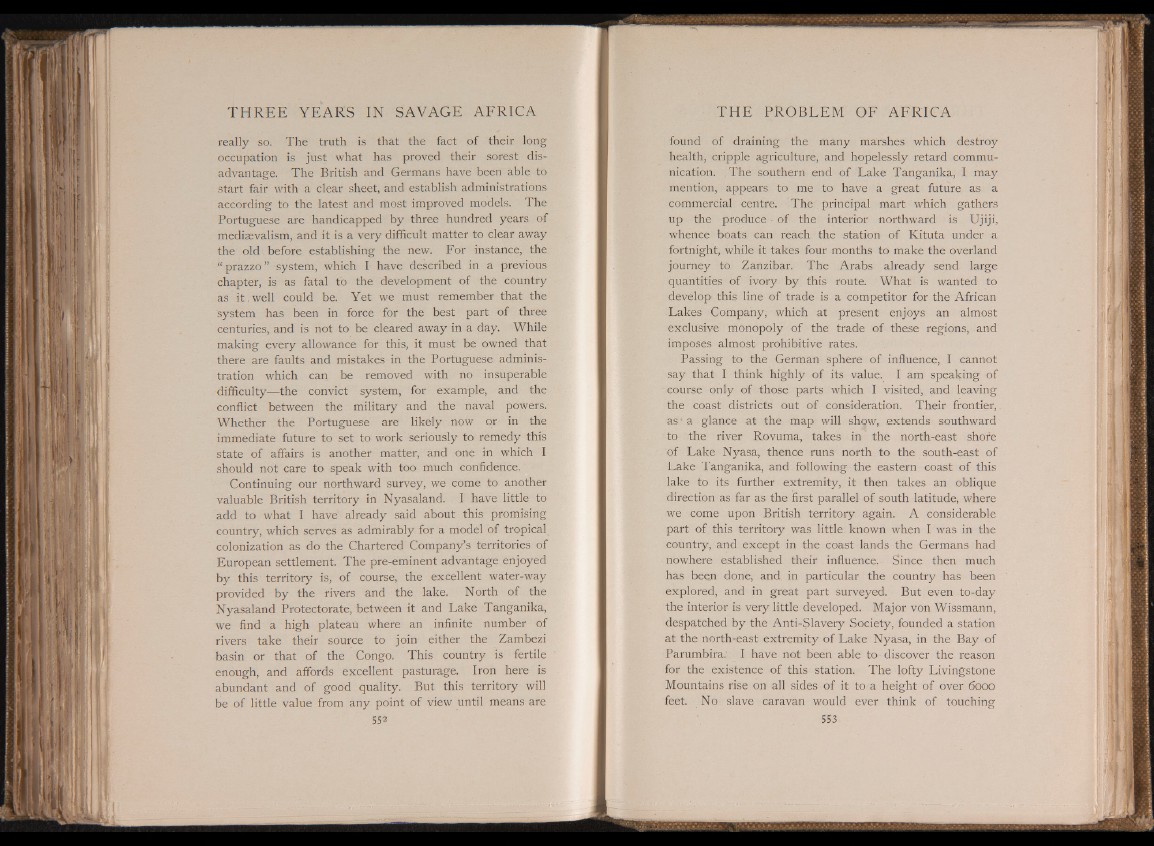
really so. The truth is that the fact of their long
occupation is just what has proved their sorest disadvantage.
The British and Germans have been able to
start fair with a clear sheet, and establish administrations
according to the latest and most improved models. The
Portuguese are handicapped by three hundred years of
mediaevalism, and it is a very difficult matter to clear away
the old . before establishing the new. For instance, the
“ prazzo” system, which I have described in a previous
chapter, is as fatal to the development of the country
as it,well could be. Yet we must remember that the
system has been in force for the best part of three
centuries, and is not to be cleared away in a day. While
making every allowance for this, it must be owned that
there are faults and mistakes in the Portuguese administration
which can be removed with no insuperable
difficulty—the convict system, for example, and the
conflict between the military and the naval powers.
Whether the Portuguese are likely now or in the
immediate future to set to work seriously to remedy this
state of affairs is another matter, and one in which I
should not care to speak with too much confidence.
Continuing our northward survey, we come to another
valuable British territory in Nyasaland. I have little to
add to what I have already said about this promising
country, which serves as admirably for a model of tropical
colonization as do the Chartered Company’s territories of
European settlement. The pre-eminent advantage enjoyed
by this territory is, of course, the excellent water-way
provided by the rivers and the lake. North of the
Nyasaland Protectorate, between it and Lake Tanganika,
we find a high plateau where an infinite number of
rivers take their source to join either the Zambezi
basin or that of the Congo. This country is fertile
enough, and affords excellent pasturage. Iron here is
abundant and of good quality. But this territory will
be of little value from any point of view until means are
552
found of draining the many marshes which destroy
health, cripple agriculture, and hopelessly retard communication.
,The southern end of Lake Tanganika, I may
mention, appears to me to have a great future as a
commercial centre. The. principal mart which gathers
up the produce • of the interior northward is Ujiji,
whence boats can reach the station of Kituta under a
fortnight, while it takes four months to make the overland
journey to Zanzibar. The Arabs already send large
quantities of ivory by this route. What is wanted to
develop this line of trade is a competitor for the African
Lakes Company, which at present enjoys an almost
exclusive monopoly of the trade of these regions, and
imposes almost prohibitive rates.
Passing to the German sphere of influence, I cannot
say that I think highly of its value. I am speaking of
course only of those parts which I visited, and leaving
the coast districts out of consideration. Their frontier,
as' a glance at the map will show, extends southward
to the river Rovuma, takes in the north-east shore
of Lake Nyasa, thence runs north to the south-east of
Lake Tanganika, and following the eastern coast of this
lake to its further extremity, it then takes an oblique
direction as far as the first parallel of south latitude, where
we come upon British territory again. A considerable
part of this territory was little known when I was in the
country, and except in the coast lands the Germans had
nowhere established their influence. Since then much
has been done, and in particular the country has been
explored, and in great part surveyed. But even to-day
the interior is very little developed. Major von Wissmann,
despatched by the Anti-Slavery Society, founded a station
at the north-east extremity of Lake Nyasa, in the Bay of
Parumbira. I have not been able to discover the reason
for the existence of this station. The lofty Livingstone
Mountains rise on all sides of it to a height of over 6000
feet. No slave caravan would ever think of touching